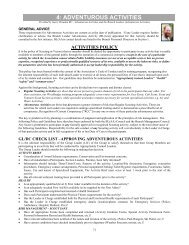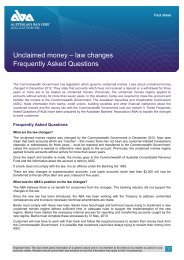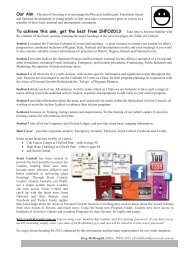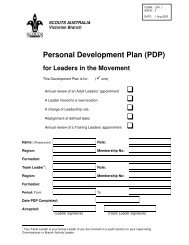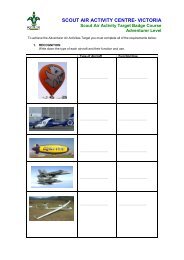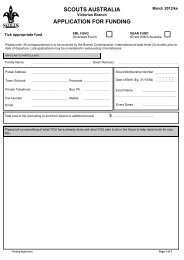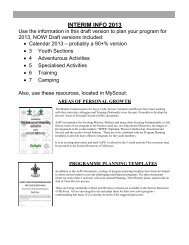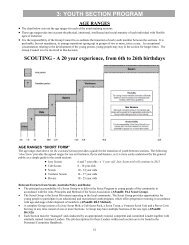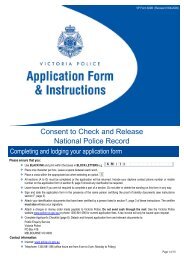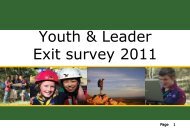INFO 2013 - Scouts Victoria
INFO 2013 - Scouts Victoria
INFO 2013 - Scouts Victoria
You also want an ePaper? Increase the reach of your titles
YUMPU automatically turns print PDFs into web optimized ePapers that Google loves.
d. doing someone else's attachments for them,e. submitting work that is not completely created by you,f. telling someone, in detail, what answers to enter on their attachments, org. knowing that someone has cheated and NOT informing the assessor about it. We know this maybe difficult for some tocomply with but we expect that if you know you will encourage those involved to either redo the work legitimately or toadvise the assessor that they cheated. Withholding this information is aiding and abetting cheating and thus you too arecheating.The persons giving the information and those using it are BOTH cheating and will BOTH receive an "NYC" in the course.In Scouting we continue to encourage collaboration and working together. This collaboration can include the following:a. discussing attachments with trainers, other students or other Leaders (Personal Leader Advisers) to understand what is beingasked forb. handing in work done alone or with the help of PLAc. getting help to correct minor errors in spelling, grammar or syntax (sentence construction)d. discussing attachment requirements and course materials so that you can better understand the material and the outcomes (thisis, in fact, encouraged)e. using other people’s ideas where they are acknowledged in the appropriate way, using a system of referencing, such as APA.Helping Each OtherYou are encouraged to help each other to learn but NOT to give the answers. One way to help is to discuss the problem but notgive the other person YOUR solution. Mentoring means guiding participants to find the solution themselves NOT giving them theanswers.Some definitionsCheating is defined as "any fraudulent response whatsoever by students to any item of assessment including any actions whichmay otherwise defeat the purposes of assessment" (ANU Handbook, 1997).Collusion: All parties who collude (get together) and copy an assessment item(s) for the purpose of deception will fail. A result of"not yet competent" will be issued. This failure will extend to the author of the original assessment item(s).Plagiarism: is "the act of taking and using another person’s work as one's own" (ANU Handbook, 1997).Any of the following acts constitutes plagiarism unless the work is appropriately acknowledged:a. Copying the work of another participantb. Directly copying any part of another's workc. Summarising the work of anotherd. Using an idea derived from another person's work.Both plagiarism and cheating constitute major infringements of the SAIT’s values. As such, any plagiarism or cheating will resultin an automatic fail and suspension from further courses.ACCESS AND EQUITY GUIDELINESThe following access and equity guidelines are designed to remove barriers and obstacles so that all participants have theopportunity to gain skills, knowledge and experience through access to VET subjects. These guidelines should be applied inconjunction with <strong>Scouts</strong> Australia VET admissions policy.Access and equity guidelines will be implemented through the following strategies: Having regard for the available human and physical resources, the organisation will provide a limited range of free VETqualifications and/or outcomes for members. Links with other providers, such as TAFE institutes will be considered where additional resources are required. Where possible, participants will be provided with the opportunity to gain a full qualification. For participants with special needs, access to additional assistance will be provided. Access to VET programs will be available to all participants regardless of gender or race. Where poor literacy and/or numeracy skills present a barrier to participation, additional support will be provided to theparticipants within the capacity of the organisation’s resources to provide such support and/or external assistance will beaccessed as required.CODE OF PRACTICEThe <strong>Scouts</strong> Australia Institute of Training (TOID 5443) Code of Practice which covers Access and Equity, Marketing, ContinuousImprovement, Mutual Recognition and Skills recognition can be found at www.sait.scouts.com.auSKILLS RECOGNITION/RECOGNITION OF PRIOR LEARNING POLICYAll participants have the right to request Recognition in respect of an element/s of competency which has been learned or skilldeveloped previously and that is not already covered by provision within the Unit of Competency for such recognition. (e.g. - aportion of a competency that needs to be signed off within a practical vocational setting – perhaps a campsite or by a workplacePage 128



